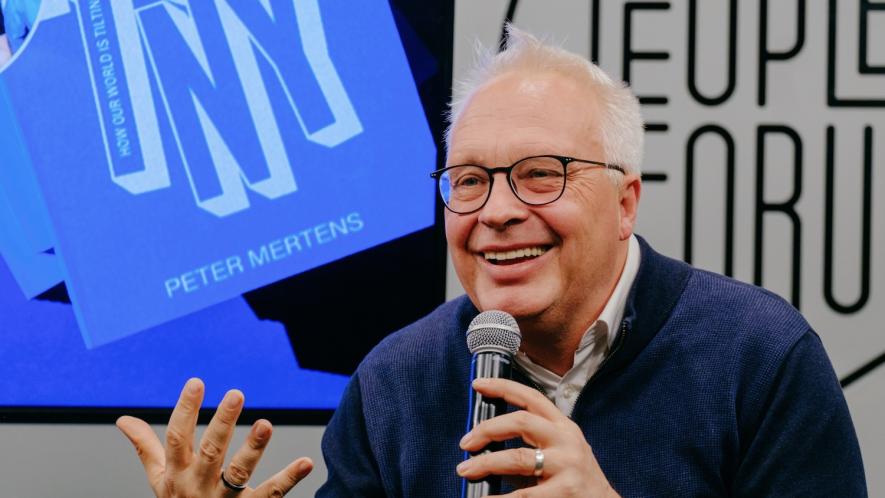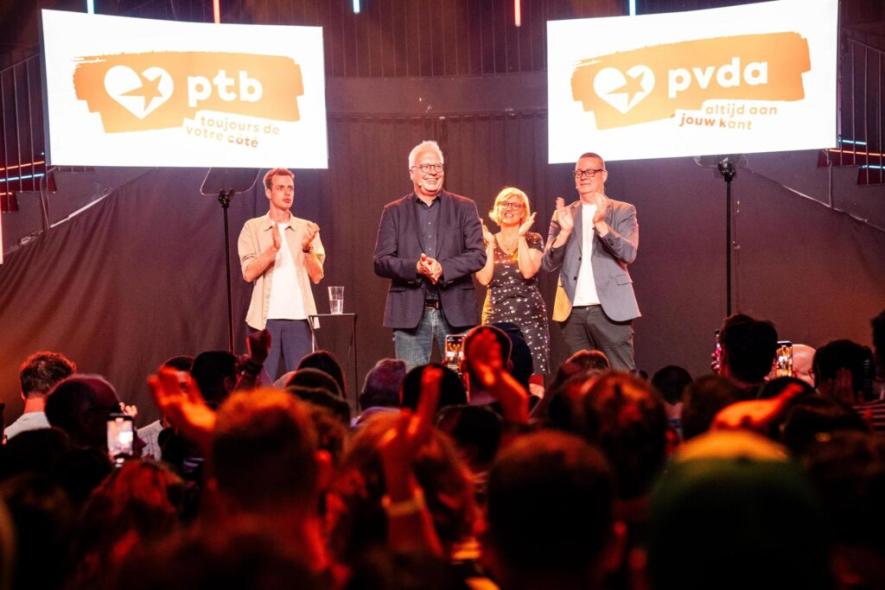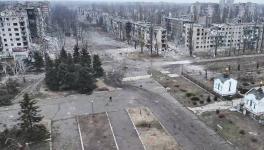‘Where There’s Working Class, There'll Always be Hope’

Peter Mertens speaking at the book launch of Mutiny at the People's Forum in New York City. Photo: Wyatt Souers
2024 was a year marked by intense struggle, unexpected geopolitical shifts, and loss for people across the world.
While millions of people took to the streets to demand an end to Israel’s genocide in Gaza, Israel expanded its genocidal and colonial violence into Lebanon, Syria, and Yemen. The daily massacres in displaced persons camps, the carpet bombing of UNESCO heritage sites, and leveling of apartment buildings with bunker-buster bombs, have unmasked the depravity of the West and its commitment to maintaining Israel as its outpost in the West Asia region at all costs.
Meanwhile, in countries across the global north and south, people face the material reality of capitalism’s inability to fulfill people’s needs. Inflation, unemployment, and poverty levels soar as governments insist on further cuts to social spending and the public budget.
This general sense of discontent and unrest and the deepening of the gap between the aspirations and well being of the working class majorities and the interests of the ruling class elites, is palpable. It has been expressed in the numerous popular, often unorganized, uprisings, against the status quo.
This global mood is the subject of the book Mutiny, written by Secretary General of the Workers’ Party of Belgium (PTB/PDVA) Peter Mertens. Mertens sat down with Peoples Dispatch editor Zoe Alexandra to discuss the book, the recent victory of Donald Trump in the US, the state of global class struggle, and how to stop the surge of the far-right.
Zoe Alexandra: You have written this fantastic book, Mutiny, which in some words, observes the state of class struggle amid a volatile geopolitical situation, arguing that as Europe is left behind, tied to US interests, Asia continues to grow stronger. Meanwhile, working people across the world are rising up more and more.
Within this framing, how can we understand the victory of Donald Trump, both the overwhelming support for his project of attacks on rights and marginalized communities, but also the mass divestment from the empty promises of the Democratic Party?
Peter Mertens: On the one hand, I think that Trump is a symbol, a crystallization of what’s been happening since the beginning of the 21st century.
All roads of this 21st century imperialism and capitalism in this kind of crisis, all lead to the “Trump phenomenon”. It’s not a one-day phenomenon, because it’s not just Trump. There’s no qualitative difference between Trump’s first term and Obama. There may not be a qualitative difference between Trump’s second term and Biden. If you see what Biden did economically, what Biden did on the imperialist stage, the interventions, and obviously supporting the first televised genocide in our history, it all leads up to this.
I do think that people are fed up with this inflation, people are fed up with the crisis being paid by workers everywhere, the people are fed up with Democratic Party support for Wall Street.
So the disengagement of working class people towards people like Biden or Kamala Harris is understandable. The same thing happens in Europe. Everyone is very afraid about the center collapsing, but the fact is that the gap between the centrist politics, the classical parties, and the everyday life of working-class people is becoming bigger and bigger.
The discourse of this talking class and this centrist politics about everything being great, like what Kamala Harris said during the election campaign, everything’s great, there’s no problems, it’s the same thing all over in Europe, with centrist politicians saying everything’s going great, and in the meantime everything is very normal. People are paying much more in energy prices, gas prices, groceries, etc. At the end of the day, there is a gap that’s widening between the talking class on the one hand, the classical politicians, and working class people. It’s becoming bigger and bigger.
And then it all leads up, on the one hand, to a phenomenon such as Trump in this area where everyone is watching, hoping for a savior somewhere because on the whole, capitalist propaganda for 25 years has been giving this immature message in movies and other cultural capitalist things about big saviors. And then they think, Trump is some kind of savior, and Bolsonaro or Milei is some kind of a savior, or the extreme right is some kind of savior.
But on the other hand, I do think also, that much like in Europe, one has to understand also that there is resistance. There was Black Lives Matter movement, there was the Women’s March, there was the re-dynamization of trade union work in Amazon, Starbucks, etc.
There is also obviously this new Palestine generation and then the occupation of universities, etc. You cannot understand the process towards fascism without seeing it also as a kind of reaction towards these new movements emerging.

Peter Mertens marches on the streets of Brussels to demand an end to the Israeli genocide. Photo: PTB
Fascism is a reaction towards the power of people’s movements. It’s the same in Europe.
This counter-power, that’s called “mutiny” in the book, at least in Europe, is not very politicized. It’s not very class conscious. It’s not already a class force. It’s not a class aware of its class interest. It is a spontaneous first level struggle. But it is big. And if we work very well among these first level movements against inflation, against the cost of living, etc., we can orient these movements towards socialist or democratic goals, and not leave them for the far right.
ZA: During his campaign, Trump spoke a lot about the war between Russia and Ukraine, how this never would have happened under him, and how he is going to end the war. During his first presidency, he made an ultimatum to Europe, saying that you actually have to pay your NATO contributions, or there will be consequences.
On one hand, what will happen with NATO under Trump? Is there going to be a major shift? Should we actually believe that he’s pressuring for peace? What impact do you think that will have on what we’ve seen is a complete unity around the NATO project in the past couple of years?
PM: First of all, that there is even this kind of discussion and propaganda from the Democrats in the US, but also from the bourgeois parties in Europe, that Trump could in some way be anti-NATO, is preposterous. Of course, he is totally in favor of the NATO project. The only thing he’s saying is that Europe also has to pay for NATO protection and for the NATO umbrella. But Obama said the same thing, just without the vocal aggression. Trump’s style is more aggressive. But the message is exactly the same. Europe has to be under the umbrella of NATO, and there has to be a NATO pillar in Europe.
What the US did the last ten years, and the widening of the European Union towards the east, was a NATO plan.
The grip of NATO itself is greater than ever. Europe, since the proxy war in Ukraine, is becoming more and more [under the influence of] NATO, and that was a long term plan from the European-US establishment since the beginning.
What about the strategic goal of US imperialism [regarding] China? Everyone agrees that there is the emergence of China as a world leader in technologies, from the treatment of raw materials, four fifths of the critical materials are treated inside of China. On the economic issue, the US is being challenged by an emerging power that will be, together with India, the biggest power in the future. Europe is already in decline after World War II, the US is in the beginning of the decline, but still a strong economic power, a very strong military power and financial power.
Trump is saying, okay, let’s concentrate on our main enemy, being China.
Biden, as one of his last acts as president, vetoed a ceasefire resolution in Israel-Palestine for the genocide. At the same time he also [approved] the launch of long-range missiles [from Ukraine to Russia] in order to maybe even escalate the war, together with some European partners, we don’t know. But I think it is for them to have the real strategic enemy, like the US establishment themselves calls it, of China.
I think it was the same, Obama, Trump one, Biden, Trump two. It will be the same. Maybe there will be a ceasefire in Europe to concentrate on that. But at the end of the day, on the bourgeois level, the European Union is totally f**cked, and is the big loser of all these games, because it is becoming, on the energy level, more and more dependent on the US, on the military level, it becomes more and more dependent on the US, on the internal level, it’s torn apart by Washington.
Now, the third biggest economy in the world, Germany, for the first time since World War II, in two years, is in recession. The most energy intensive industries, like the petrochemical industry, etc., and the steel industry, are really in crisis, because of the embargo on Russian gas, because German industry exports were driven by cheap Russian gas.
And then Washington said to Berlin, we have to cut. And Berlin said yes. The suicidal character of this decision is unprecedented. The consequences are not only for Germany, but also, in the production chain, it’s also the Czech Republic, Hungary, even Poland, and Belgium who are in this German production chain.
So even if it’s the big companies, Siemens or Volkswagen, who are shutting down, it’s not only a consequence for Germany, it’s for workers everywhere. It’s crazy.
And then there is the disadvantage in technology. It’s amazing what the Chinese are doing, because if you see all these measures that were taken, even under Biden with semiconductors. To print the semiconductors, there was one piece of technology which the US was most advanced in and the Netherlands. And then Biden said to Premier Rutte at that time, you have to forbid the sale of this technology to the Chinese, and he said, yes, sir, of course, sir. And now, Rutte has become president of NATO, because he said yes so nicely to the US…so they said two years ago, the Chinese are five years behind on this technology and now the Chinese have developed their own.
The more there are sanctions towards the Chinese on the technological issues, while it hurts them in a short-term perspective, in the long term they are getting more and more advanced at every stage.
In the 19th and 20th centuries, European capitalism had technological advancements, of course with the patents etc., but the most advanced technologies were German and French, now they can’t even build a decent plane in Europe! The non-investment in science, technology, and other capacities, this era is becoming more and more Chinese, and the Europeans are losing. And the US is trying some protectionism, and that’s the era, and it’s a conflicting era we’re living in.
ZA: With Obama’s pivot to Asia, in the United States prior, there were largely positive perceptions of China. It was, and continues to be, a major trading partner of the United States, so obviously there’s a lot of exchange between the two countries.
However, with the pivot to Asia an intense propaganda machine was launched and continues to today to paint China as the biggest enemy of the United States. We’ve seen public perception of China completely tank. China has been painted as the enemy. Now there’s a lot of support for this idea that we must defeat the Chinese, they’re taking our jobs, they’re responsible for everything, etc.
To what extent has this been seen in Europe? As you mentioned, Europe is falling behind in part because they have cut themselves off from China. Is there the same popular support for these kinds of policies? Is there still the possibility of Eurasian cooperation, is that completely off the table at this point? And is Europe going to partner with the US in this build for war against China?
PM: That will be the big discussion in the years that come now with the new commission in place, there’s a new European Commission and it has the lowest votes ever of a European Commission. The extreme right, Meloni, are implicated in this new commission. It’s crazy that social democracy has supported the far right for the first time since World War II, in the European Commission.
But if you see the forecasts, I think it will be a very pro-Washington commission, with this axis leaning more to Berlin, Warsaw, and the Baltic states instead of the historical axis of Berlin and Paris. That’s a major shift.
And the second thing is there’s a political crisis that’s big in the European Union. There are no European leaders at this moment. Who is leading France? It’s Macron. He got himself in a situation where he’s the hostage of Marine Le Pen, the extreme right. And he maneuvered himself totally autonomously in this situation, because the Nouveau Front Populaire (New Popular Front, NFP) and Jean Luc Melenchon won the election, obviously, but Macron refused to have a prime minister of the Nouveau Front Populaire. And now he ended up being hostage to Le Pen.
In Germany, there will be elections at the end of February. [It seems] the Christian Democrats will win, and the extreme right, AfD, is second in the polls. It’s crazy, the fact that there will be the normalization of Nazism in Germany, the return, that they are now the second in the polls. Then there is the Sahra Wagenknecht Party, the left-wing nationalist, liberal chauvinist party which is third in the polls.
So it will be a political crisis, and there is no leadership in Europe.
China is a great trade partner of Europe. Europe was crazy enough to follow the US with the decoupling of Russia. If they do the second step with the decoupling of China, it’s not only digging their own grave.
Politically they’re tending to follow the US, but economically they’re still bourgeois powers that just say, no, we’re not going to decouple.
ZA: The last year has also been quite intense for Europe, with many unexpected victories for popular sectors in elections, like in France and very important advances in Belgium, but also serious setbacks with a general growth of far right parties across the continent.
Help us understand, is Europe lost to the far-right? Where are we seeing mutinies in the continent, will they be enough to stop the far right? Is Europe lost?
PM: Where there is a working class, there will always be hope. Our support has to be to the working class when there is hope.
When there was fascism in Germany in the 30s, and even in the Weimar Republic before 33, we in the communist movement stood in support of the Communist Party.
Even when the Communist Party of Germany was forbidden, there were all these petty bourgeois everywhere in Europe saying, well, okay, the Germans brought it on themselves, etc. and now they’re punished. We said, no, our class brothers are in Germany. They are being persecuted.
I’m saying that because some people say the same about the US, that there is no hope in the US, there is Trump, and all the petty bourgeois are saying this, and they call them stupid Americans.
But our American friends are the working class, the trade unions, parties like PSL (the Party for Socialism and Liberation).
There are two Americas. There is the ruling class, there is the fascist America, there is Wall Street. And there is the people’s America.
I don’t agree with the stance of writing off a continent because that includes the majority of the working class in Europe. Because there is misery. There is hunger. There’s people working full time, going to food banks.
In Germany, in the heart of Europe, working class people are having more and more difficulty, and we have to organize them. And I know there is confusion. The ruling class is promoting fascism everywhere.
This situation is not linear, it’s in shocks and we are before a period of shocks. Inside the shocks, it can go both ways. On that perspective, I do agree with Naomi Klein when she says that the people that have the best ideas, plans, and organization to weather the shocks, can be the best in place to to orient a movement towards fascism or aggressive capitalism, or towards socialism or democratic perspectives.
I think the left in Europe has to prepare for that, and not only for elections. The election is important, but the party has to be rooted in the class and has to have support in the class. But you cannot gain support from the class if you don’t believe in it. There has to be a left, a left for the working class. If you don’t have the left, you cannot win. You also have to believe in your own project and have to want to win.
People sense if you are a talking party, or if you are a doing party. [You have to] have this conviction in your own projects, in socialism, in the working class identity of your own party.
As a party, I get an internationalistic view. If you stay Eurocentric, you cannot win. It is a global situation. There is a global production chain. There is a global shift, all that is happening regarding protectionism, Trump’s tariffs, the measures, you cannot understand if you don’t understand a little bit of the global situation.
The situation is difficult, but it’s not hopeless. At the end of the day, [the ruling class] are a bunch of amateurs with too much power and too much money, and the state force, the police, and the army, yes, but still a bunch of amateurs with too much power.
It will be difficult. Europe is not lost, because there’s a working class in Europe. Much like the US is not lost. Like Argentina is not lost.
ZA: I want to focus on your experience and your organization, which is the Workers’ Party of Belgium (PTB/PVDA). And in many ways, many people look to the Workers’ Party of Belgium, amid this very volatile and shifting situation, this uncertain and changing world, it has been a bright spot. How is it that in many regions, PTB was directly facing far-right parties, having overcome liberal centrists? What is the perspective of PTB on how to stop the far-right and organize the working class?
PM: In the local elections we had in Brussels, Brussels being the capital of Belgium and also capital of the European Commission and of NATO, being an openly and proud anti-NATO party, becoming the second party in Brussels with 20% to 25% is important. So it means it’s also in the belly of the beast of Europe. There is a possibility.
I do think people have to see that as a sign. In each case, the other side, the ruling class, also sees it as a very scary sign. The fact that we have 20 or 25% in Brussels, the Israeli embassy and the US embassy don’t like it at all, that we in Antwerp, in the biggest industrial city, we have 20% out of the second party.

Peter Mertens along with PTB/PVDA members Raoul Hedebouw, Jos D’Haese, and others. Photo: PTB
On the organizational level, there are no miracles. We have a class orientated party with sections in working class neighborhoods and in the factories, and it’s a lot of daily work. And we are going a little further, creating a party that is rooted inside the working class and inside the class in the people’s neighborhoods.
One example we have is hospitals with free medicine, 11 of them, called Medicine for the People. And so we are reaching out with that towards a lot of working class people. And they trust us because no one does it like that. Because even if Europe still has a good social security system, in comparison with the US, it’s not free, and we are giving it for free.
There is also trust because we live in working class areas and all our elected officials continue to live and work on an average workers’ salary. And everyone knows it, because if you were in federal parliament, you get €7,800 from the parliament, but we are living on €2,300 and the rest is to construct the party and the campaigns, and everyone knows it.
And the bourgeoisie hates it and calls us populist, but among the people they know, okay, we don’t agree with the PTB because of this and that, but at least they are honest people. And at least they do what they are saying.
And everyone knows if you’re only there with the election campaign, if you only show up canvassing six months before the election, people are not stupid at all. They know which organization is there all year long, day in, day out, in winter, and summer, and that’s the big thing.
We talk a lot about big confrontations with fascism, but the most important thing we can do is open up these discussions and engage with people. For example, someone might say, I am on the waiting list for public housing, and then they say well that Syrian family fled the war and now they have public housing. How is that possible? So then we try to steer this discussion, validate their frustration but identify that the main problem is that they do not have decent public housing and they want public housing, that the main problem is socioeconomic about their life, not about someone else’s. And we would say that the solution is not to kick out the Syrian family but to build more public housing. Meanwhile, the extreme right would say, kick out the Syrian family, but then there is still a long waiting list for public housing, so it is not even a solution.
With this kind of discussion, we try to confront the fascists’ line of kicking downwards, and we are trying to make people look towards [real solutions]. It is very difficult, but we have to try.
ZA: What kind of work is PTB preparing for next year?
PM: There will be a new very right-wing government in Belgium. We had the general election in June, but since it is a coalition system, they are still talking. But it will be the more right-wing parties, harsh neoliberal parties to impose austerity 2.0 cuts in the pensions again, the social security, etc.
But also the right wing on the Democratic level. The discussion about freedom to protest, freedom to block roads for trade unions, etc. And also, very pro-war parties. Now we had a double hypocritical stance on Israel with the Belgian government. Well, because, in your words, Belgium took a progressive stance because I think also from pressure. But in deeds they did not block it at all. And now we will have an openly pro-Zionist [government].
There are discussions among the trade unions, progressives, and peoples movements all over Belgium to prepare a big time protest against this new government. [It will be centered on] the socioeconomic level and on a base level, the pensions, salaries, inflation due to the increased taxes on consumer goods, these issues will touch the most people and impact them.
But there are also discussions now in Belgium among progressive forces, in all these movements, to link also the democratic question and the international question towards the same resistance. And it could be possible that we are building up towards a general strike in spring.
I think it will take some time to do what, on these different levels. And I think it’s why we need it and the forces advocating for this kind of strategy would be supported by the party.
ZA: Well, sounds like there’s a lot that we’re going to be following up on with this struggle and to just ask you one final question. We are facing a very uncertain global context with the return of Donald Trump who promises more war, more sanctions, and more exclusion. How do you see the state of international class struggle in the face of such a menacing figure? And what gives you hope at this moment?
PM: I strongly believe that these fascism 2.0 figures like Trump and Milei, they’re also a reflection of the fear of a system in decline. And I think you can not only see these figures as the old power figures, they may look like it, they may talk like it on steroids, they may have this bodybuilder talk, but at the end of the day, there’s a kind of fear. I do think that that fear is because the economic shift is going towards China. It’s happening and I do think that the political ideological shift will be towards movements that say, okay, we will develop South-South cooperation. And the more and more there will be sanctions against China, tariffs, unilateral sanctions, etc., the more China will search for this alternative.
But it’s the same for other countries in the South. I read Trump’s tweet a week ago about the BRICs countries…
The idea that the BRICS Countries are trying to move away from the Dollar while we stand by and watch is OVER. We require a commitment from these Countries that they will neither create a new BRICS Currency, nor back any other Currency to replace the mighty U.S. Dollar or, they…
— Donald J. Trump (@realDonaldTrump) November 30, 2024
But the more this kind of discourse will be hegemonic, the more in the South itself they will develop, bilateral agreements etc.
So I see the history as action, reaction, action, and there will be a tendency to fascism in the declining economies. But there will also be a reaction again, and from the South and also I do think in the North.
What gives me hope is a more historical view of how history works. It is not a short term hope, because it will be messy in the US and Europe and I mean it will be bloody, we see the face of this with the genocide. But also in the medium term, in the long term, they have no future, they have no perspective. They have nothing to offer to humanity at all. They have no coherency, they do not even have rationality because now, the rationality and the productivity and the technologies are in China, etc. So they have nothing to offer the world except their hollow strong man politics. So I am hopeful.
Mutiny is available for purchase at 1804 Books.
Get the latest reports & analysis with people's perspective on Protests, movements & deep analytical videos, discussions of the current affairs in your Telegram app. Subscribe to NewsClick's Telegram channel & get Real-Time updates on stories, as they get published on our website.
























